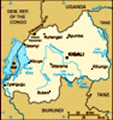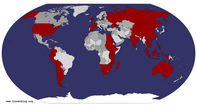Advertisement
Published: July 20th 2009
It's just a short taxi ride to the border with Rwanda and, after a delay due to Ugandan immigration being on a tea break, I'm soon in my sixth country of this trip. The first time in my life I heard of Rwanda was due to the horrific genocide that took place in 1994, but everything I've heard in the last few months has been indicative of a country with an eye to the future. Travellers have told of tarmac roads, scheduled buses with only one person per seat, and a ban on plastic bags. There have also been tales of massive interference in the affairs of DRC, in a bid to control some of the mineral wealth there. So it certainly seems as though Rwanda isn't mired in its tragic recent past.
A cramped matatu takes me from the border to Ruhengeri, where I switch to a proper minibus. It's fairly comfy and does leave on time. I'll certainly be glad if all my journeys in Rwanda are this pleasant but, then again, the country's so small that nowhere is more than a handful of hours from anywhere else.
The road to Gisenyi skirts the east and south

 Beer on the beach
Beer on the beach
Bikini Tam-Tam barof Parc National des Volcans, home of the country's mountain gorillas and site of Dian Fossey's research station. Rwanda has been called "The Land of a Thousand Hills" and certainly that's all that's visible in every direction - green slope upon green slope. What's even more astounding is just how much of this land has been given over to agriculture. Small fields cover the hillsides, with terracing enabling even the steepest of slopes to be farmed. This maximal use of agricultural land is necessary because Rwanda has one of the highest population densities in the world (over 300 people per square kilometre), i.e. lots of mouths to feed. Unless my Maths fails me, that means there's less than a square of side 60m for each Rwandan. Land disputes are thought to have been one of the contributing factors in the 1994 genocide.
After hearing from several travellers that Rwanda was devoid of tourists, I'm unamused when my first choice of accommodation turns out to be full. The second is almost full too but they have a double (which they're optimistically calling a suite) that's available. It's basic and a scandalous $20. With no other options on my list, I

 Anti-sugar daddy poster
Anti-sugar daddy poster
Cross-generational sex appears to be a big problem in many of the countries of East Africahave to take it. I am to find that prices here are generally much higher than Uganda, with transport representing the only real value for money. Shaving foam and deoderant are both over $10.
The second shock is just how few people speak English. Again, travellers had told me they'd been able to get by only in English, but I'm guessing they never came to Gisenyi. I'm forced to bust out some appalling French, a language I last "spoke" more than twenty years ago - my recent trip through South America ensures I insert Spanish words and pronunciation to the confusion of all. The accent here is rather weak, certainly not the Inspector Clouseau style that I'm fond of, and I can only assume some vocabulary is different too as my words for vegetables and bill receive blank looks. I try the hotel's buffet for lunch and eat it to the strains of Edith Piaf.
Gisenyi is situated on the shores of Lake Kivu, with DRC on the opposite side of the water. The WLP describes it as a ritzy resort town but that's a bit of a stretch. The main, upper, part of Gisenyi is a Generic
African Town with uneven roads and pavements aiming to trip you up. Having "mzungu" shouted at me grew old a long time ago but it's back with a vengeance after a relative lull in southwestern Uganda. I see a crocodile of orange jumpsuit-clad men escorted by armed guards, who I assume must be part of a chain gang. It's hot and bright enough for some of the town's women to carry colourful parasols.
The roads lower down, paralleling the lake, show more signs of affluence but even the larger houses there are in unkempt grounds. A tree-lined avenue lies closest to the lake and I follow it all the way round to the border with DRC. I see more UN vehicles on this stretch than I think I've seen in the rest of Africa put together, all heading for DRC, home of the world's largest UN presence.
There's a slight frisson to be had by simply being around Lake Kivu, as it is one of only three known bodies of water in the world that could experience a so-called "lake turnover". Large quantities of carbon dioxide and methane are dissolved in the lower levels of the lake, and
scientists hypothesise that volcanic activity could perhaps drive these out of solution, creating a methane explosion and issuing forth a cloud of carbon dioxide (similar to what happened at Lake Nyos in Cameroon in 1986). The phrase used to describe this is an "extinction event", which vividly illustrates the prospects for human and animal life in the vicinity. This hasn't happened in recorded history, and currently the methane is being used as an energy source for a local brewery. Supposedly the Rwandan government is intending to exploit the methane on a much larger scale in the future.
South of the town, I find Tam-Tam beach, site of a lakeside bar called Bikini Tam-Tam. It's a slice of the Med in East Africa. As the sun sets, its red silhouetting the peaks of Parc National des Volcans to the north, a mix of reggae and hip hop floats through the evening air from the bar's sound system. A lone windsurfer pumps his sail to augment the slight breeze as, nearer shore, a crowd of locals splash happily in the lake's waters. I commandeer a table from which to watch the scene, accompanied by a brochette, fries, and an imposing 720ml
bottle of Primus beer. There's a handful of whities amongst the customers, but fortunately it's only the locals who start dancing. The waitress smiles at me and pats my bare knee, a gesture I find as incomprehensible as her French.
A morning visit to a nearby bakery produces a baguette, a round of "Gouda" cheese, and the news that DC is $1.40 per can but normal Coke only 90c. I don't know if these inflated prices are due to being in the "provinces" or not, but if Kigali is no cheaper then my time in Rwanda will be brief indeed, with my next destination Burundi also laying claim to my dwindling stash of US dollars. With nothing much to do in Gisenyi bar sunbathe, which isn't a favourite activity of mine (though the contrasting shades of my farmer's tan could definitely do with evening up), I head for Kigali.
Dull but possibly useful info i. I took a (special hire) taxi from Kisoro to the border with Rwanda, which cost USh15,000. The driver claimed that this (expensive) fare was because the road was in bad condition - it isn't, so don't allow yourself to accept a poor fare
for that reason. It took about 20 minutes to get to the border.
ii. The moneychangers at the border offer much better rates than you'll get in Gisenyi or Kigali for changing USh. If you also feign disinterest at their initial approaches then they'll eventually offer you a rate pretty much identical to the Yahoo Finance one.
iii. The immigration formalities are nice and easy on both sides of the border. Remember to put your watch back an hour.
iv. There are regular minivans from the border to Ruhengeri (the immigration people can tell you the timetable). The minivan costs RWF400 and gets rather full. The journey should take about 45 minutes.
v. Ruhengeri has changed its name to Musanze but I didn't hear anyone actually call it that.
vi. I think the only minibus company going from Ruhengeri to Gisenyi is Virunga Express, which has several departures a day. I took the 11:20AM one, costing RWF900 and taking about 1 hour 20 minutes. Note that the luggage boys will expect a tip even for just touching your luggage.
vii. I stayed at the Auberge de Gisenye, very close to the bus stop, paying RWF10,000 for a "suite" with a
TV. The shower was cold water only but you could order a bucket of hot water from the kitchen. There's a good buffet available for lunch and dinner - one heaped plate of veg is RWF1,500.
viii. I met an English couple who told me about the City Hotel, which they said was better than the auberge and only RWF8,000. I don't know its address though.
ix. Texas Bakery mentioned in the WLP appears to not exist any more.
x. Bikini Tam-Tam is a pleasant place to spend the sunset. You can also swim there.
xi. If you would like some local interaction, there's an English teacher called Kenneth who's eager for conversation (and donations to his school). He'll probably track you down anyway.
Advertisement
Tot: 0.455s; Tpl: 0.016s; cc: 41; qc: 155; dbt: 0.3284s; 1; m:domysql w:travelblog (10.17.0.13); sld: 1;
; mem: 1.6mb























Travel
non-member comment
www.TheAirGorillaBlog.com
You gave details about Gisenyi it's interesting I would like to know more about travel. I impressed by your blog You can find me at www.TheAirGorillaBlog.com